SEARCHENGINES
When to Target Low Search Volume Keywords
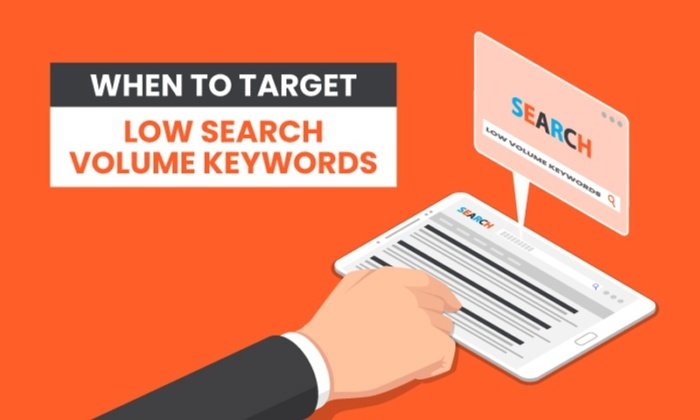
Going after the “low-hanging fruit” is common advice in the SEO world. Ranking for those terms will help you rank for bigger terms down the line, at least that’s the standard belief.
Do you think that’s true?
There might be some truth to it, but there are many reasons to target low search volume keywords whether your site is brand-new or well-seasoned.
In this guide, I’ll cover why low search volume keywords are crucial to SEO and show you how to find them.
Reasons to Target Low Volume Keywords
There are many scenarios where you would want to target low search volume keywords. Let’s take a look at six of my most prominent reasons.
1. If User Intent Is High
User intent refers to the reason why someone is searching a specific phrase into Google. For example, when someone searches for the “best tennis shoes” versus “tennis shoes,” each of these keywords has a different intent.
Someone who searches for the best tennis shoes is likely looking for reviews of tennis shoes. When we put that into Google, the results prove to be true.
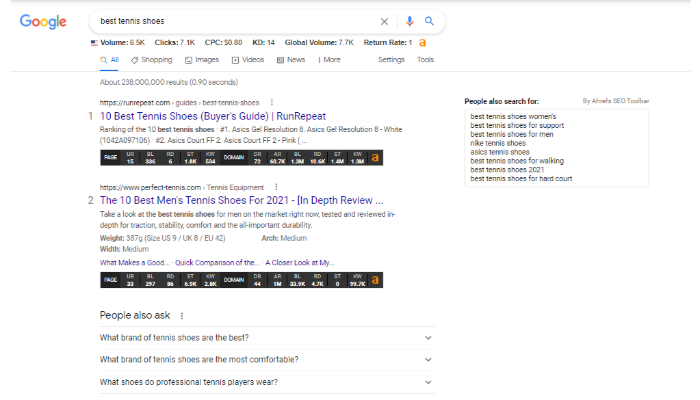
The majority of results Google provides are reviews of the best tennis shoes because that’s what people want. This tells us most people who search this phrase end up clicking reviews.
If we change the search to “tennis shoes” the results are dramatically different. Now we’re not receiving results for reviews of shoes, but we’re receiving results of places to buy shoes and different brands instead.
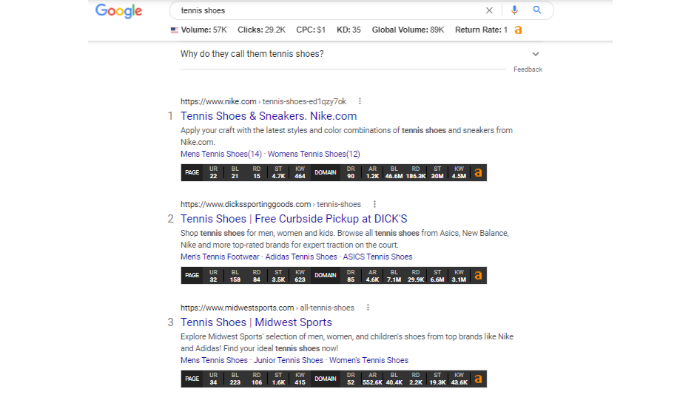
What does this mean?
It means the keyword “best tennis shoes” has an informational-based search intent. This could mean the person is interested in buying shoes but hasn’t entirely decided on a brand or a location to buy them.
They might want to read reviews, surf the web, and shop around a little before making a final decision.
When someone searches “tennis shoes,” it’s clear they’re ready to buy and they know what they want. This is considered transactional intent — meaning they want to make a purchase.
If we’re writing a review on the best tennis grips and we’re trying to get people who are researching rather than buying, we may want to target the following keywords.
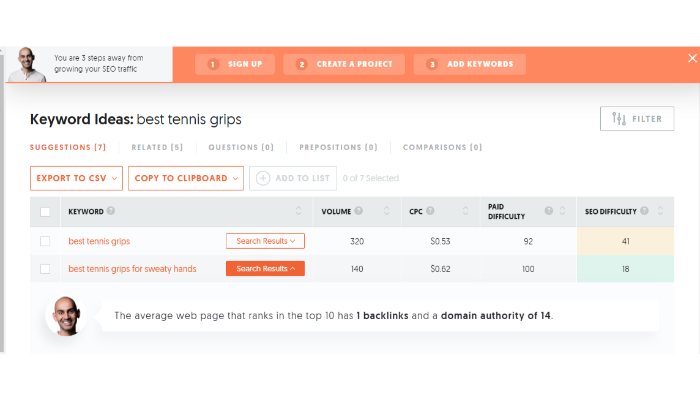
The keyword “best tennis grips for sweaty hands” is a very specific keyword. Even though it only averages 140 searches per month, it could still be a worthwhile long-tail keyword because it’s highly targeted and the search intent is spot on.
2. If Search Difficulty Is Low
Search difficulty refers to how difficult it will be for you to rank for a specific keyword. One of the main reasons people target low keywords is because it’s easy for them to rank quickly without much work.
If you refer back to the previous image, you’ll see “best tennis grips” has a search volume of 320 with a difficulty of 41. This means the keyword might be challenging to rank, and would require more backlinks and higher authority.
The keyword below it, “best tennis grips for sweaty hands” will be much easier to rank for because it only has a search difficulty of 18. As you can see, it has a lower search volume, though.
One of the basic principles of SEO is to find as many low competition keywords as possible and include them in your content as naturally as you can. By doing this, you might spread yourself wide over many different keywords, but they’re all low competition so you’ll be able to rank quickly, get traffic on your site, and increase your domain authority to begin to target more competitive keywords.
3. If It’s a Long-Tail Keyword That Contains a High Volume Keyword
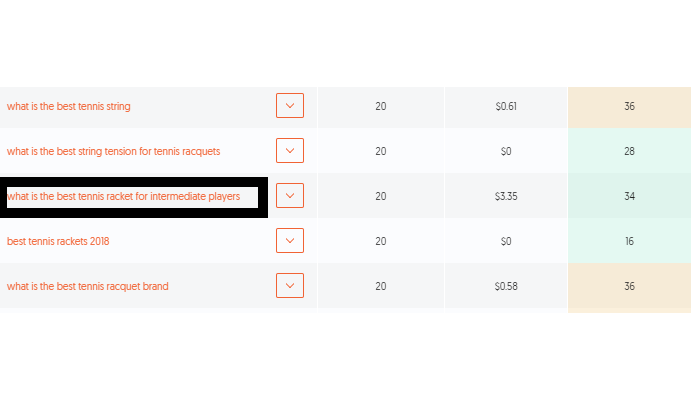
Take a look at the list of keywords above. These all have low search volume. If you look at the one highlighted with a rectangle around it, you’ll see it contains nine words, which makes it a “long-tail keyword.” Long-tail keywords are phrases that contain more than four words and oftentimes, they contain a high search volume keyword in the middle.
That’s the case with this example.
While “what is the best tennis racket for intermediate players” may only get 20 searches per month, the keyword “best tennis rackets” gets 8,100 searches per month. As a result, you may want to target these long-tail keywords and position an entire piece of content around them with the intent of eventually getting the high-volume keyword.
When you’re starting out with a newer site or trying to grow an existing one, you’ll target these types of keywords that contain the high search volume keyword because they offer you a way to get both of them without having to go all in on the highly competitive phrase. The same goes for high search volume, low competition keywords.
4. If You’re Covering a Niche Topic
If we continue on with the tennis example, tennis is considered a niche topic. It’s something that doesn’t interest everyone, but those who enjoy it will want to know as much as possible about the sport. They’re highly interested in it and will spend a lot of money to purchase products to make them better at it.
As a result, it is beneficial to go after low search volume keywords even if they don’t bring about a lot of traffic. Google is putting a lot more emphasis on the comprehensiveness of a website and rewarding those who cover topics to the fullest extent.
In fact, a great example of this came in a 2021 update where they targeted affiliate websites with “thin content.” Thin content refers to pieces that don’t add a lot of value or personality to the products or services they promote.
Affiliate marketing websites are notorious for this.
Let’s say you have a site and you’re promoting tennis rackets on Amazon. Some affiliate sites will simply copy everything in the Amazon product description over to their site and slap an affiliate link on it.
You can’t do this, according to Google. They refer to it as “scraped content” and while they won’t penalize you for it, they’re rewarding sites that add insight and interesting anecdotes in addition to product specifications.
How does this tie into low search volume keywords and niche topics?
Targeting low search volume keywords isn’t always about traffic. The goal of your site should be topic mastery and expertise. Google is paying a lot more attention to this nowadays. You can’t simply be the best keyword research expert and expect to rank right away anymore.
Google wants to see you actually understand the topic and are passionate about it. As a result, you can cover extensive topics by researching low search volume keywords that provide a well-rounded piece of content for the reader. Doing so shows you not only understand SEO but understand the topic you’re covering as well.
5. If It Has a Low Cost-Per-Click (CPC)
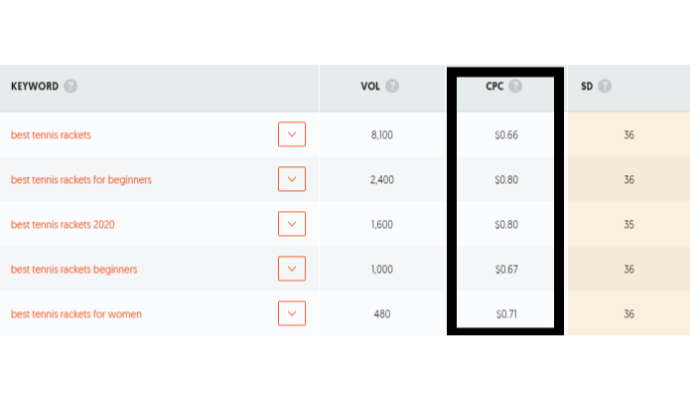
The cost-per-click is the average cost an advertiser pays to get someone to click on their Google ad. If certain low search volume keywords also have a low cost per click you might want to target them because it would be easy for you to beat out the competition and get to the top of the SERP even if it’s only for 50 people a month.
Keywords that have a high CPC are more competitive and will cost more to get you one click. For example, if you’re targeting a keyword with a $4.00 CPC, chances are you’ll have to have a large budget and be willing to pay more than that per click if you expect to get on the first page.
That cost can add up quickly and it doesn’t mean a conversion. You’re paying more than $4.00 just to get someone to click through to your website. The rest is up to you.
By going after low search volume keywords, there is less competition and the cost of getting someone to your website is lower.
6. For Link-Building Purposes
We all know link building is an important piece of the SEO puzzle and acquiring as many high-quality backlinks as possible is crucial if you expect to ever rank for anything. One way a lot of people acquire backlinks is through manual outreach.
You reach out to website owners in your niche to see if they’re interested in either including a link to your content on their site or fixing a broken link by replacing it with your great piece of content.
For this to work, you need to have a great piece of content with traffic that shows the website owner you’re worth their time.
A great way to do this is targeting a bunch of low search volume keywords that are relevant to your niche but might not be the most competitive. By doing so, you’re creating a piece of content that is topically relevant and interesting to the person you’re reaching out to. This increases the chances of them including a link on their site.
FAQs About Low Volume Keywords
Ubersuggest is a great tool and is pictured above in many of the images. All you need to do is input a phrase and the tool will provide relevant keywords as well as their search volume.
There’s really no specific volume because the goal is to find a keyword with as low competition by high search volume as possible. If you can do that, you’ll have an easier time ranking in a shorter amount of time.
Finding low search volume keywords with high traffic isn’t easy. If it was easy, you wouldn’t have thousands of people competing against each other, and we’d all get to rank for whatever keywords we wanted. Utilize Google Trends, research using tools like Ahrefs, and spy on your competition by seeing what keywords they rank for.
Finding the search volume of a keyword is as simple as punching it into one of the various tools. You can use Ubersuggest, Ahrefs, SEMRush, and even Google Keyword Planner. All of these tools will display search volume. Keep in mind these are estimates so the results may vary from tool to tool.
Conclusion
Finding low search volume keywords is a great way to get traffic to your website whether you’re just starting out or making sure your site is topically relevant. There are many pieces to the SEO puzzle and we’re always trying to figure out how to get ahead of our competition.
If you’re struggling to figure out keyword research and SEO, we can help. Be sure to keep these tips in mind as you conduct your research and put together the next list of keywords you plan to target.
Do you think low search volume keywords can help you rank for higher search volume keywords? Let me know why in the comments.
See How My Agency Can Drive Massive Amounts of Traffic to Your Website
- SEO – unlock massive amounts of SEO traffic. See real results.
- Content Marketing – our team creates epic content that will get shared, get links, and attract traffic.
- Paid Media – effective paid strategies with clear ROI.
SEARCHENGINES
Daily Search Forum Recap: April 17, 2024
Here is a recap of what happened in the search forums today, through the eyes of the Search Engine Roundtable and other search forums on the web.
The Google March core update still is causing volatility and it is deepening. Google may make changes to the crawl stats report in Search Console. Google Search Console now shows unused ownership tokens. Google Maps will drop the review drafts. Google Add added generative AI for image generate for Demand Gen campaigns. Google Search is testing more sitelinks designs.
Search Engine Roundtable Stories:
-
Deepening Google Core Ranking Volatility Hits Yesterday & Today
I know we just reported on more volatility this Monday, possibly related to the Google March 2024 core update, but we are seeing even more volatility over the past 24 hours related to this update. This volatility shows deepening movement for those who were hit, which is incredibly sad in many cases. -
Google Search Console Adds Unused Ownership Tokens
Google Search Console has a new security feature under user and permission management to help you manage your unused ownership tokens. Basically, it helps you manage who has permissions to your Search Console profiles and who should not, maybe some legacy verifications. -
Google: Should We Explain The Crawl Stats Report in Search Console
Martin Splitt from Google posted a one-line question asking, “Should we do something to explain the crawl stats report in GSC?” This was posted on Mastodon, which has a small audience, but the responses were pretty good. -
New Google Ads AI Generated Image Tool For Demand Gen Campaigns
Google Ads announced that Demand Gen campaigns are getting generative AI tools to create image assets. This is rolling out to advertisers around the world in English with more languages to come later this year, Google said. -
Google Tests Horizontal Lines For Sitelinks & People Also Ask
Google Search is testing horizontal lines under the sitelinks and the people also ask elements in the search results. This is a long horizontal line that goes across the while search result snippet. -
Google Maps No Longer Will Support Draft Reviews
Google Maps will soon stop supporting drafting reviews for local business listings and Google Business Profiles. Google said that starting July 16, 2024, review drafts will no longer be supported. -
Doogler In Google Play Area
Some of you love photos of dogs, so here is another one of a Doogler, a Google dog, in a play area, at the Google office. This was shared by the Life at Google Twitter account.
Other Great Search Threads:
Search Engine Land Stories:
Other Great Search Stories:
Analytics
Industry & Business
Links & Content Marketing
Local & Maps
Mobile & Voice
SEO
PPC
Search Features
Other Search
Feedback:
Have feedback on this daily recap; let me know on Twitter @rustybrick or @seroundtable, on Threads, Mastodon and Bluesky and you can follow us on Facebook and on Google News and make sure to subscribe to the YouTube channel, Apple Podcasts, Spotify, Google Podcasts or just contact us the old fashion way.
SEARCHENGINES
Daily Search Forum Recap: April 16, 2024
Here is a recap of what happened in the search forums today, through the eyes of the Search Engine Roundtable and other search forums on the web.
Google will fight the site reputation abuse spam both algorithmically and with manual actions. Google is testing thumbs-up and down in product carousels. Google Ads similar product carousel is being tested. Google Search updated its image documentation. Google AdSense has a new ad format named ad intents.
Search Engine Roundtable Stories:
-
Google Will Fight Site Reputation Abuse Spam Both With Manual Actions & Algorithms
Google’s new spam algorithm update also introduced new spam policies including the upcoming site reputation abuse policy that won’t go into effect until May 2024. Google has confirmed it will fight site reputation abuse spam using both manual actions (humans) and algorithms (machines). -
Google Search Tests Thumbs Up/Down Buttons In Product Grid Results
Google launched the style recommendations with thumbs up and down buttons not long ago after testing it in January. Now Google is showing this thumbs up and down buttons in the product grid search results, so Google can see what you like or dislike and then show you more products that you do like. -
Google Ads “Similar Product” Carousel
Google has a similar products section and carousel for Google Ads sponsored listings. We have seen similar products and similar shopping related results from the organic / free listings but now I am seeing examples of a search ad carousel for “similar products.” -
Clarification: Google Search Supports Images Referenced From src Attribute
Google has clarified in its image search help documentation that images are only extracted from the src attribute of img tags in Google Search. This is not new, but Google decided to update its documentation based on some questions it received about the topic. -
Google AdSense New Ad Intents Formats – Links & Anchors In Content
Google AdSense announced a new auto ads format named “Ad intents.” Ad intents places links and anchors showing organic search results with ads into existing text and pages on your site related to your content. Yea, it takes your content, and hyperlinks it to the Google search results. -
3-Wheel Tricycle At Google
Google’s Ann Arbor office has this 3-wheel tricycle that some Googlers have used over the years to get around the office. This one looks like the hot pink Huffy brand. I spotted this recently on Instagram but the photo is from 2016.
Other Great Search Threads:
- I don’t have an update to share at this time, but you should continue to use classic GMC for rules and supplemental feed support. Here’s how to switch back if needed, AdsLiaison on X
- In this case, I’ve been introducing a new metric; “likelihood to get search traffic” to see what we should add to XML sitemaps. Some pages might do incredibly well on other metrics, but simply, Joost de Valk on X
- It does have a title, and it loads a HTML page – so this seems normal. The JavaScript doesn’t seem to be loading well, so if you’re the site owner, I’d suggest reading ou, John Mueller on X
- News! Google Ads removed in some accounts the possibility to hover over a daily budget to edit it. You need to hover now and then click on “Edit budget”. Why changing things to less user-friendly ones, Thomas Eccel on X
- The time has come! Registration for the Zürich Product Experts Summit has now opened for eligible PEs in Europe. Virtual registration will follow in May. Check your inboxes and the KB for more details., Google’s Product Experts Program on X
- When I want to add positive search terms as exact match, I first add them quickly as broad, then bulk switch them over to exact match. lately I’ve been getting this error and the only way I can switch the keywords is by using Ads Editor., Greg on X
- Yeah, quantity says nothing about quality and even less about user value or business value. Sometimes the solution to a “crawl budget problem” is not to make the server faster & search engines, John Mueller on X
- Which the best method to link to the alternative language of a website, WebmasterWorld
Search Engine Land Stories:
Other Great Search Stories:
Analytics
Industry & Business
Links & Content Marketing
Local & Maps
Mobile & Voice
SEO
PPC
Search Features
Other Search
Feedback:
Have feedback on this daily recap; let me know on Twitter @rustybrick or @seroundtable, on Threads, Mastodon and Bluesky and you can follow us on Facebook and on Google News and make sure to subscribe to the YouTube channel, Apple Podcasts, Spotify, Google Podcasts or just contact us the old fashion way.
SEARCHENGINES
Daily Search Forum Recap: April 15, 2024
Here is a recap of what happened in the search forums today, through the eyes of the Search Engine Roundtable and other search forums on the web.
There was more Google core update volatility over the weekend. Google defended its statements about forums ranking for almost everything. Google responded to The Verge’s printer article mocking its search results. Google AdSense publishers are seeing really big earnings drops. Google crawl budget is allocated on the hostname level. Google threatened California over its new proposed link tax bill with pulling investments and its news results from the state.
Search Engine Roundtable Stories:
-
Weekend Google Core Ranking Volatility Taxing Site Owners
As I mentioned briefly in my Friday video recap, I was starting to see renewed chatter on Friday morning around more Google search ranking volatility. I spotted some renewed chatter that lead through Friday, into Saturday and today. So I figured I’d cover it and share some of what SEOs are saying over the weekend. -
Google Responds To The Verge Mocking Its Search Rankings For Best Printer
Nilay Patel, editor-in-chief of the Verge posted a new article with the intent to both rank for [best printer] in Google Search, as well as mock Google for how he can game Google’s search rankings using AI-generated content, while throwing in some affiliate links. Google’s John Mueller responded saying, “People seem to really enjoy it.” -
Google Goes On Defensive On Its Search Quality & Forum Results Statements
Recently, we covered some of Google’s rationale for ranking forums like Reddit and Quora so well in the Discussion and Forums box for many queries. Just a few days ago, we covered how I was sad to see Google ranking some dangerous and potentially harmful forum threads for health-related queries. -
Google Threatens California: Tests Removing Links To Publishers & Pauses Investments
On Friday, Google responded to a pending bill in the California state legislature, the California Journalism Preservation Act (CJPA), that would require Google to pay a link tax to publishers by testing removing links to California based publishers and pausing investments in news publishers within the state. -
Google Crawl Budget Is Allocated By Hostname
Google gives every hostname its own allocated crawl budget. So that means each domain, subdomain, etc has its own unique crawl budget. -
Google AdSense Publishers Reporting Huge RPM Earnings Drops
Many Google AdSense publishers have been reporting massive declines in their earnings and RPMs (page revenue per thousand impressions) since late February. This comes a couple of weeks after we reported the switch from CPC to CPM bidding in AdSense did not have a negative revenue result for publishers. -
Google Android Figurine Display Case
At the Google Chicago office they have dozens of Android figurines on display in this glass display case. I guess they all have a name and are labeled with details. I found this image on Instagram.
Other Great Search Threads:
- These things are done when they’re done, it’s hard to predict exact timelines., John Mueller on X
- Google just changed the layout for product detail window , also include the near by store in this, Khushal Bherwani on X
- Google Ads charging 0.01 for a few European countries, WebmasterWorld
- GPTBot got stuck in giant content farm, Orhan Kurulan on X
- I created a chatbot with the Google Webmasters Documentation. Based on the current data, the tool has: 1. Over 15,000 requests 2. Over 3,000 users 3. I received support from @JohnMu and @g33konaut from Google itself, Dido Grigorov on X
- I am the new Paid Media News Writer of @sengineland ! Such an honour – can’t believe it! I get to work with the likes of @rustybrick and @MrDannyGoodwin!! Dreams do come tru, Anu Adegbola on X
Search Engine Land Stories:
Other Great Search Stories:
Analytics
Industry & Business
Links & Content Marketing
Local & Maps
Mobile & Voice
SEO
PPC
Search Features
Other Search
Feedback:
Have feedback on this daily recap; let me know on Twitter @rustybrick or @seroundtable, on Threads, Mastodon and Bluesky and you can follow us on Facebook and on Google News and make sure to subscribe to the YouTube channel, Apple Podcasts, Spotify, Google Podcasts or just contact us the old fashion way.
-

 MARKETING7 days ago
MARKETING7 days agoRoundel Media Studio: What to Expect From Target’s New Self-Service Platform
-

 SEO6 days ago
SEO6 days agoGoogle Limits News Links In California Over Proposed ‘Link Tax’ Law
-
SEARCHENGINES6 days ago
Daily Search Forum Recap: April 12, 2024
-

 SEARCHENGINES5 days ago
SEARCHENGINES5 days agoGoogle Core Update Volatility, Helpful Content Update Gone, Dangerous Google Search Results & Google Ads Confusion
-

 SEO5 days ago
SEO5 days ago10 Paid Search & PPC Planning Best Practices
-

 SEO7 days ago
SEO7 days agoGoogle Unplugs “Notes on Search” Experiment
-

 MARKETING6 days ago
MARKETING6 days ago2 Ways to Take Back the Power in Your Business: Part 2
-

 MARKETING4 days ago
MARKETING4 days ago5 Psychological Tactics to Write Better Emails














